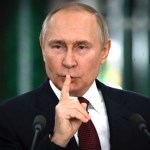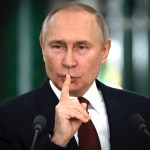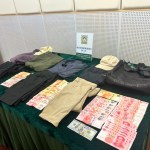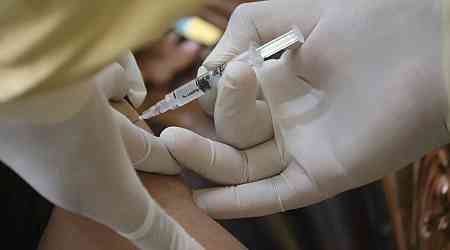The phone kept ringing and Kolker kept hanging up until finally his father called to confirm the grim news. The elder Kolker had been charged with treason, the family later learned, a crime that is probed and prosecuted in absolute secrecy in Russia and punished with long prison terms.
Treason cases have been rare in Russia in the last 30 years, with a handful annually. But since the 2022 invasion of Ukraine, they have skyrocketed, along with espionage prosecutions, ensnaring citizens and foreigners alike, regardless of their politics.
That has brought comparisons to the show trials under Soviet dictator Josef Stalin in the 1930s.
The more recent victims range from Kremlin critics and independent journalists to veteran scientists working with countries that Moscow considers friendly.
These cases stand out from the crackdown on dissent that has reached unprecedented levels under President Vladimir Putin. They are investigated almost exclusively by the powerful Federal Security Service, or FSB, with specific charges and evidence not always revealed.
The accused are often held in strict isolation in Moscow’s notorious Lefortovo Prison, tried behind closed doors, and almost always convicted, with long prison sentences.
In 2022, Putin urged the security services to “harshly suppress the actions of foreign intelligence services, promptly identify traitors, spies and saboteurs.”
The First Department, a rights group that specializes in such prosecutions and takes its name from a division of the security service, counted over 100 known treason cases in 2023, lawyer Evgeny Smirnov told The Associated Press. He added there probably were another 100 that nobody knows about.
The longer the war goes on, “the more traitors” the authorities want to round up, Smirnov said.
Two years earlier, the legal definition of treason was expanded to include providing vaguely defined “assistance” to foreign countries or organizations, effectively exposing to prosecution anyone in contact with foreigners.
The move followed mass anti-government protests in 2011-12 in Moscow that officials claimed were instigated by the West. Those changes to the law were heavily criticized by rights advocates, including those in the Presidential Human Rights Council.
Faced with that criticism at the time, Putin promised to look into the amended law and agreed “there shouldn’t be any broad interpretation of what high treason is.”
And yet, that’s exactly what began happening.
In 2015, authorities arrested Svetlana Davydova, a mother of seven in the western region of Smolensk, on treason charges in accordance with the new, expanded definition of the offense.
She was charged over contacting the Ukrainian Embassy in Moscow in 2014 to warn officials there that she thought Russia was sending troops into eastern Ukraine, where the separatist insurgency against Kyiv was unfolding.
The case drew national attention and public outrage. Russia at the time denied its troops were involved in eastern Ukraine, and many pointed out that the case against Davydova contradicted that narrative. The charges against her were eventually dropped.
That outcome was a rare exception to the multiplying treason and espionage cases in subsequent years that consistently ended in convictions and prison terms.
Paul Whelan, a United States corporate security executive who traveled to Moscow to attend a wedding, was arrested in 2018 and convicted of espionage two years later, and sentenced to 16 years in prison. He denied the charges.
Ivan Safronov, an adviser to the Roscosmos space agency and a former military affairs journalist, was convicted of treason in 2022 and sentenced to 22 years in prison. His prosecution was widely seen as retaliation for his reporting exposing military incidents and shady arms deals.
“It’s a very good cautionary tale case for them that journalists shouldn’t write anything about the defense sector,” his fiancee and fellow reporter Ksenia Mironova told AP.
The FSB also went after scientists who study aerodynamics, hypersonics and other fields that could be used in weapons development.
Such arrests swelled after 2018, when Putin in his annual state-of-the-nation address touted new and unique hypersonic weapons that Russia was developing, according to Smirnov, the lawyer.
In his view, it was the security services’ way of showing the Kremlin that Russian scientific advances, especially those used to develop weapons, are so valuable that “all foreign intelligence services in the world are after it.”
He stressed that all the arrested scientists were civilians, and that “they practically never go after military scientists.”
Many of the scientists denied the charges. Their families and colleagues insisted they were implicated over something as benign as giving lectures abroad or working with foreign scientists on joint projects.
Kolker, the son of the detained Novosibirsk physicist, said that when the FSB searched his father’s apartment, they looked for several presentations he had used in lectures given in China.
Nevertheless, FSB officers yanked the 54-year-old physicist from his hospital bed in 2022 and flew him to Moscow, to the Lefortovo Prison, his son said.
The ailing scientist called his family from the plane to say goodbye, knowing he was unlikely to survive prison, the son said. Within days, the family received a telegram informing them he had died in a hospital. DASHA LITVINOVA, TALLINN, MDT/AP
































